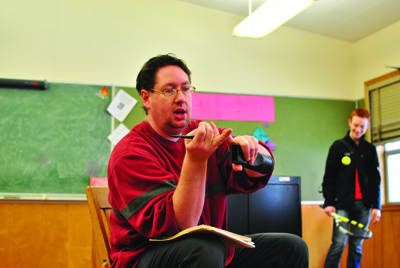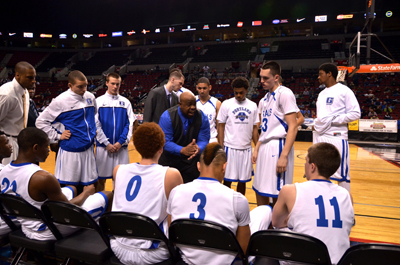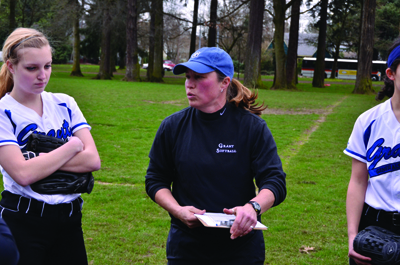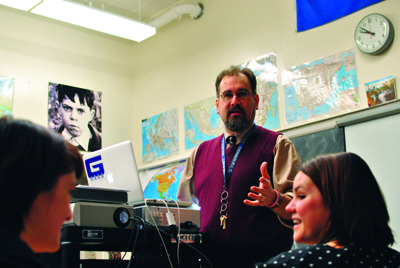Craig and Colleen Johnston felt like they were going to go crazy. Their six-year-old son, Caleb, had pulled them into the kitchen on a recent evening and was pointing at something. But they didn’t know what that something was. “Do you want some blueberries?” his mom asked. Caleb shook his head no, pulling on his mother’s finger.
His dad tried to intervene. “How about an orange? An orange would be tasty,” Craig Johnston said. But again Caleb responded with a shake of his head.
Caleb’s parents tried everything they could to understand what Caleb wanted. They pulled things off shelves, drew pictures and asked questions. It’s a common occurrence in their North Clackamas household. Caleb hasn’t spoken a word in six years.
At Grant High School, Craig Johnston is a busy teacher. On the surface, he seems like any other teacher in the classroom. But what separates him from some of his coworkers is that he isn’t at Grant all day. Johnston leaves his classroom right after lunch, hops in his car and races home to care for Caleb as soon as he steps off of the school bus. He does this every day without fail. His son is both autistic and non-verbal, and he can’t be left alone.
Finding a balance between parenting an autistic son and the responsibilities of a teacher can be challenging. For six years, the Johnstons have had to learn new ways of communication. Currently, it’s done with a lot of finger pulling and pointing. As much as the family tries to normalize the situation, the reality is Caleb will always need someone to watch over him. Johnston is trying to do that, as well as teach chemistry and coach the robotics club.
“I sometimes don’t know how I balance it all. I’m tired all of the time,” Johnston says, “but making sure I communicate with my family helps.”
Colleen Johnston agrees.
“In our family, communication is everything,” she says. “We write down what our kids are doing, what Craig has, and write down the volunteering that I do.”
Craig Johnston was born in 1978 in Washington, D.C. His family relocated to Tigard six months later. But soon after, his parents split up and Johnston spent much of his childhood alternating between them.
He attended Tigard High School and the four years he spent there were some of the best years for him. In the 600 kids that were a part of his graduating class, Johnston says he was friendly with most of them. He was also deeply involved with his youth group. “Having a bonfire, sitting with friends and playing my guitar was a big part of my high school life,” Johnston says.
He graduated in 1992 and spent a year at the Oregon Institute of Technology. The school wasn’t a good fit so he traveled to Germany where he became immersed in the life and culture of the people surrounding him. Johnston became so enthralled that he decided to major in German at the University of Oregon.
During his junior year, he met Colleen Hilburger. “We would hang out with one another but it was always with other people. It wasn’t until summer that we got to know each other,” Craig Johnston recalls.
Johnston had promised Hilburger he would call her after school let out. She had graduated and was living in Portland. It took a while before he mustered up the confidence to call her. But when he did, he could tell by her voice that she had been waiting. He asked her out and she said yes.
“We never really dated. We just hung out and went to do stuff,” Craig Johnston says. “At some point, we just knew that we were going to spend the rest of our lives together.”
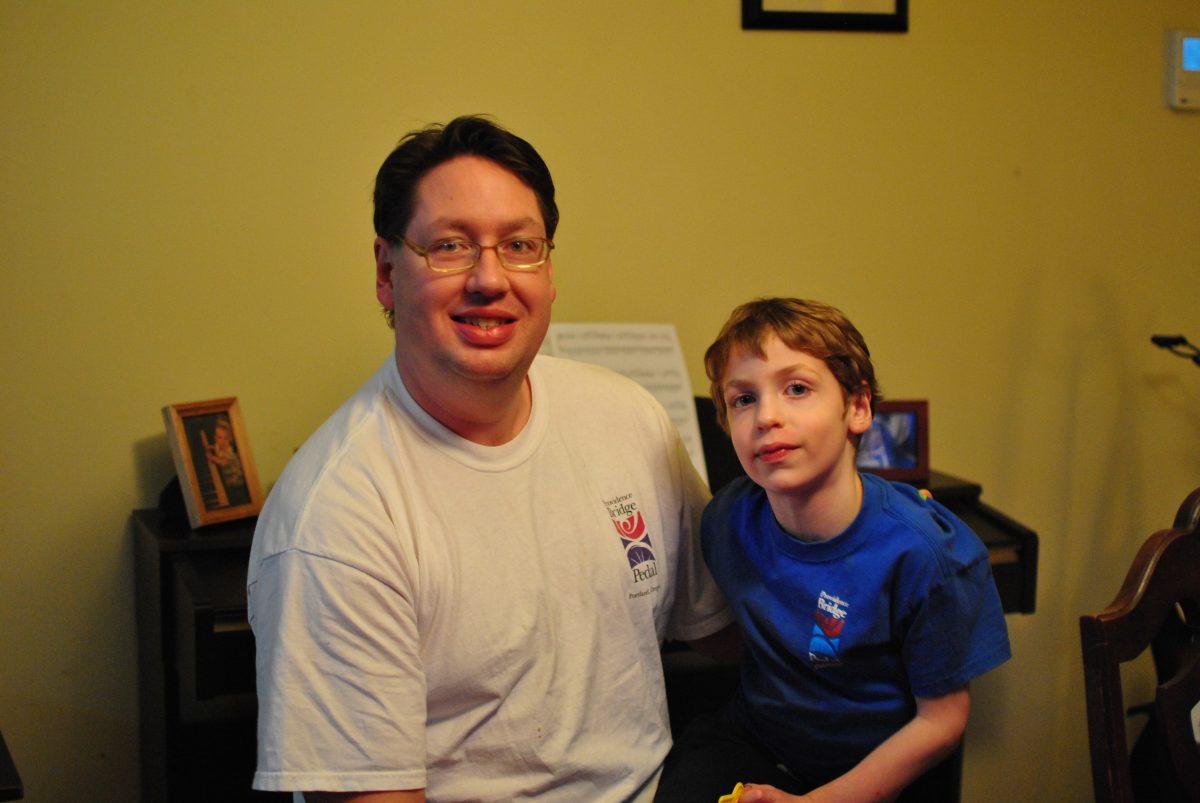 She remembers the night he proposed. They were driving together down to Eugene to get ice cream. “Right before he proposed, our car broke down like in the middle of a dirt road,” she recalls.
She remembers the night he proposed. They were driving together down to Eugene to get ice cream. “Right before he proposed, our car broke down like in the middle of a dirt road,” she recalls.
But they made it to the ice cream shop and on bended knee Craig proposed. And then a year later, on Aug. 26, 1995, they married.
It wasn’t long before Craig Johnston realized his German major wasn’t enticing potential employers to hire him. So he went to Portland State University and majored in biochemistry. Johnston had originally planned on majoring in both biochemistry and German until he went to Germany. Switching back wasn’t a new idea for the guy who had loved chemistry since high school.
“My teacher’s name was Mr. Rolf and I just connected with him. I sat in the front of the class and just had a conversation with him while everyone else was looking at me weird. But I got it,” he recalls.
Before Johnston came to Grant, he taught night school at Marshall and worked at a lab called VOC Technologies.
Their first child, Caitlin, was born in 1997. Six years later, their son Connor was born. And Caleb entered the picture in 2006.
For a while the Johnstons didn’t notice any problems with their youngest. “He was a little bit slower than others, but all of our kids were slower to walk and slower to read. So it just seemed like the kids matured a little bit slower, which was fine,” Craig Johnston says.
Like Caitlin and Connor, Caleb began to walk and talk. “He was starting to get a pretty decent-sized vocabulary when all of the sudden he lost the ability to speak, which is common for an autistic child. That’s when we started having questions,” Colleen Johnston explains.
For the Johnston family, the next few months went by quickly. They took Caleb to the doctor and to specialists. “In our meetings with the specialists, that’s when we started to hear the word ‘autistic,’” Craig Johnston recalls, noting that testing confirmed the diagnosis.
“We always knew that Caleb was slower than other kids. Just because he’s now labeled as autistic doesn’t mean that we treat him any different than before,” his dad says. “The hardest thing for me was dealing with autistic labels.”
As a mother, Colleen Johnston says having Caleb around makes the family take things a little slower and be more thorough.
As important as it is for the Johnstons to treat Caleb as normally as they can, the reality is must take extra measures to watch him. Instead of going to nearby North Clackamas Elementary like Connor, Caleb must take a bus into Portland that has a special education program.
Colleen Johnston works as an insurance verification supervisor for Providence Health Systems, so the family must work hard to make sure things are covered. For Craig Johnston, balancing the responsibilities of a father and a teacher overlap. His son is either left at home with Caitlin or must come to work with him. The students don’t seem to mind.
“Caleb’s always hanging around in the robotics room, watching us experiment and messing around with power tools,” says robotics student and junior Nick Alvey.
Sophomore Brianna Hayes adds about Johnston: “You can tell he’s a real family guy. His kids are his top priority.”
After Caleb and Johnston leave school, they usually go back home where the family is waiting with dinner on the table. Like any other family, they laugh and tell stories about their days. Except for Caleb. He usually sits with a large smile on his face but not a single word comes out of his mouth.
“It’s kinda hard that Caleb can’t talk but he’s still a good brother,” Connor says. “He likes me and we get each other in our own way.”
For the Johnstons, the inability to communicate effectively is the hardest hurdle to overcome. “A lot of times, we can figure out what Caleb wants, but it takes a lot of guessing. He’ll never be able to tell us that he wants a peanut butter sandwich,” says Craig Johnston.
Colleen Johnston adds: “Most of the time, we can understand Caleb by him pointing to what he wants but then there are days when I almost break down. He’ll point and I’ll ask him if it’s 15 different things and he isn’t talking about any of them.”
The family remains optimistic that sometime in the near future they will learn to communicate better with Caleb.
“We’ve been meeting with specialists, and are trying to get a speech type program,” Colleen Johnston says. “Right now he points or motions to what he wants. But we’re trying to get a computer aid to help him.”
Systems like that are expensive, sometimes costing upwards of $7,000. But whether or not the communication comes easily, Craig and Colleen Johnston will always care for their son.
“Communication might not always be easy but we’ll work it out. We always work things through as a family,” Colleen Johnston says.





























